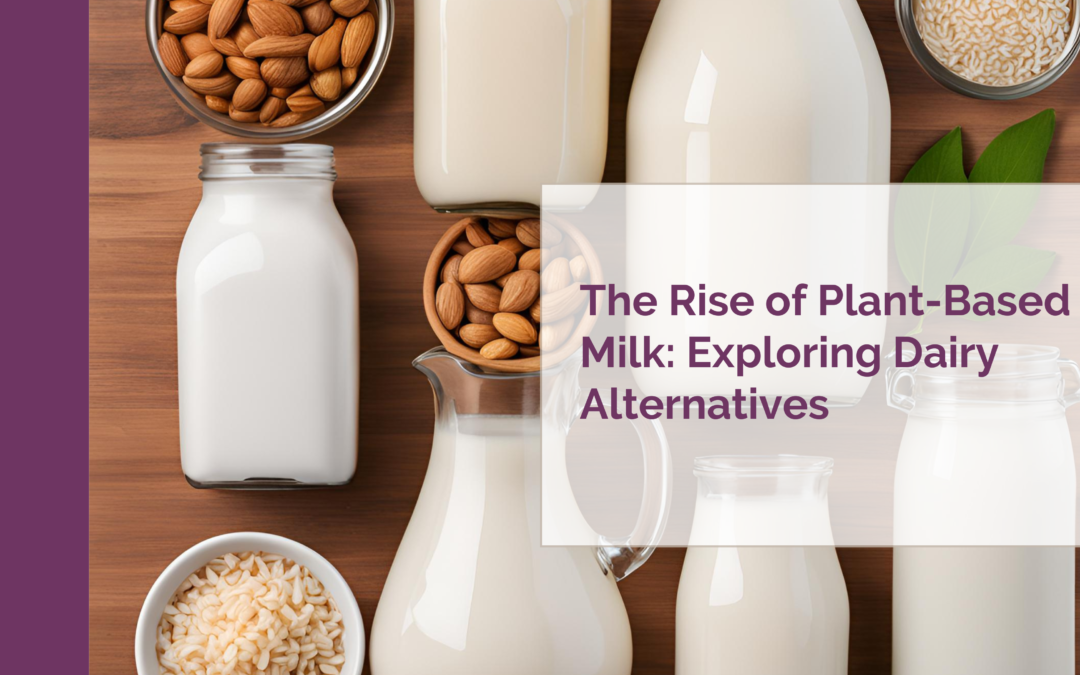Plant-based milk is increasingly popular, especially as more people seek dairy alternatives due to dietary restrictions like lactose intolerance, allergies, or personal choices to include more plant-based foods. Each type of plant-based milk offers unique nutritional profiles, flavors, and additives, making it challenging to know what’s best for you. Let’s go through the various options, how they compare nutritionally to cow’s milk, what additives to look out for, and the role of fortification.
Overview of Plant-Based Milk Types
Each plant-based milk comes from different sources, which gives it unique characteristics. Here’s a look at the most common options:
- Soy Milk: One of the oldest and most popular alternatives. It’s high in protein and has a mild, creamy flavor.
- Almond Milk: A widely available option with a light, slightly nutty taste but can be watery and low in protein.
- Oat Milk: Creamy and slightly sweet, it’s often a favorite in coffee or lattes but is lower in protein.
- Rice Milk: One of the least allergenic options, but low in protein and can be watery.
- Coconut Milk: Distinct in flavor and creamy but very low in protein.
- Pea Protein Milk: Made from yellow split peas, this milk is relatively high in protein and has a neutral taste.
- Cashew Milk: Creamy with a mild, nutty flavor but generally low in protein.
- Hemp Milk: Made from hemp seeds, it has a somewhat earthy taste and contains omega-3 fatty acids but low protein.
- Flax Milk: A newer addition, it’s low in protein but provides omega-3s.
Nutritional Comparison to Cow’s Milk
Cow’s milk provides a balance of protein, fat, and carbohydrates, along with naturally occurring calcium, vitamin D (from fortification), and vitamin B12. Here’s how plant-based milks stack up:
| Type | Protein (per cup) | Calories (per cup) | Key Nutrients | Taste and Texture |
|---|---|---|---|---|
| Cow’s Milk | 8-9 g | 90-150 | Calcium, Vit D, B12 | Creamy |
| Soy Milk | ~7-9 g | 80-100 | Calcium, potassium | Creamy, mild taste |
| Almond Milk | ~1-2 g | 30-60 | Low-cal, often fortified | Light, slightly nutty |
| Oat Milk | ~2-4 g | 100-120 | Calcium, B12, B12 | Creamy, slightly sweet |
| Rice Milk | <1 g | 90-120 | Low-cal, hypoallergenic | Thin, mild flavor |
| Coconut Milk | <1 g | 50-80 | MCTs, low-cal | Thick, strong coconut flavor |
| Pea Milk | ~7-8 g | 70-100 | Potassium, calcium, phosphorus | Creamy, neutral taste |
| Cashew Milk | ~1-2 g | 25-50 | Low-cal, often fortified | Creamy, nutty |
| Hemp Milk | ~2-3 g | 70-100 | Omega-3s, iron | Thin, earthy flavor |
| Flax Milk | 1-4g | 25-50 | Omega-3s, fortified | Light, neutral taste |
As you can see, soy and pea milk are closest to cow’s milk in protein content, making them good choices if you’re looking to replace cow’s milk protein. Other options, like almond and rice milk, are lower in protein but can be useful if you’re looking for lower-calorie or nut-free alternatives.
It’s important to shake the container of plant-based beverages before serving to ensure the nutrients are evenly distributed throughout the drink.
Additives in Plant-Based Beverages
Many plant-based milks contain additives for texture, flavor, and preservation. Here are some common additives and their roles:
- Gums (e.g., xanthan gum, guar gum): These help thicken and stabilize the milk, giving it a creamier texture. Most people tolerate gums well, but they can cause digestive issues in large amounts.
- Emulsifiers (e.g., sunflower lecithin, carrageenan): These keep the ingredients from separating. Carrageenan is sometimes avoided due to potential gastrointestinal irritation, although studies show mixed results.
- Oils (e.g., sunflower or canola oil): Some milks, especially oat milk, add oils for creaminess.
- Natural Flavors and Sweeteners: Many plant-based milks come in sweetened or flavored versions, which provide a variety of flavours like chocolate, vanilla, or strawberry.
Fortification of Plant-Based Beverages
One of the main differences between cow’s milk and plant-based beverages is the nutrient profile. Numerous plant-based milks are enriched with essential vitamins and minerals, particularly calcium and vitamin D, to make up for some of the nutritional differences. Here’s a breakdown of common fortifications:
- Calcium: Cow’s milk is naturally high in calcium, essential for bones and muscle function. Plant-based milks typically have calcium added to reach similar levels.
- Vitamin D: Since vitamin D is often lacking in plant-based foods, most plant-based milks are fortified with it to match the levels in cow’s milk.
- Vitamin B12: It’s crucial for nerve function and DNA synthesis, but you’ll mostly find it in animal products. That’s why many plant-based milks add B12 to help out those on vegan diets.
- Vitamin A, E, and B2 (Riboflavin): These vitamins are sometimes added to enhance the nutritional profile.
Fortified plant-based milks are safe and effective in providing these essential nutrients, especially for those who don’t consume dairy. Again, remember to shake before serving!
Which Plant-Based Milk is Closest to Cow’s Milk?
If you’re looking for a plant-based milk that’s nutritionally closest to cow’s milk, consider these factors:
- Protein: Soy and pea milk have comparable protein levels to cow’s milk, making them the best options for protein replacement.
- Texture and Flavor: Oat milk is often praised for its creamy texture, making it a popular choice for coffee and lattes. Pea milk is also smooth and has a mild flavor.
- Nutrient Fortification: Check for calcium, vitamin D, and B12 fortification, especially if you rely on plant-based milk as a dairy substitute.
Overall, soy milk is the closest in nutritional content, followed by pea milk. Both provide a good amount of protein, essential nutrients, and a texture similar to cow’s milk.
Choosing the Right Plant-Based Milk for You
Consider your nutritional needs, dietary preferences, and taste preferences:
- If you need protein, Soy and pea milk are the best options.
- For coffee and cooking: Oat, Soy, and pea milks tend to froth and thicken well.
- For omega-3s: Hemp and flax milks provide beneficial fatty acids.
Quick Recap
- Types of Plant-Based Milk: Soy, almond, oat, rice, coconut, pea, cashew, hemp, flax.
- Nutrition: Soy and pea milk are high in protein; almond and rice milk are lower in calories but lack protein.
- Additives: Thickeners and emulsifiers add texture; generally safe in moderation.
- Fortification: Calcium, vitamin D, and B12 fortification are beneficial, especially for those on vegan diets.
- Closest to Cow’s Milk: Soy and pea milk are most similar nutritionally, while oat milk is closest in texture.
Plant-based milks offer diverse options to fit different health and dietary needs, and fortification makes them even more nutritionally balanced. Let me know if you’d like a deeper dive into any particular type or further information on any additives or nutritional specifics!
Learn more: The Complete Guide to Black Beans: Nutrition, Benefits, and More
Do you need a dietitian consultation?
GET IN TOUCH






